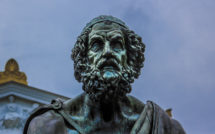

This is part of our special feature on Crime and Punishment.
panic vision
1.
from slumber a shifted view
neoliberalists knock demanding my hands
i refuse but still the clocks are winding
i yearn to kiss the inner petals
where softness drives the snow plows
it’s negative 3 degrees & i have no passport
when i arrive at the airport the time zones
are different & my name is not my name
upon further foot-tapping I find chomsky
idling by speaking calmly
reminding me that words
are as evolutionary as survival
now we are here
where no exit signs illuminate
the promise the possibility
that light could be different
2.
it’s the middle of the night
she says I have been dreaming
she says I have been dreaming bad dreams
i wrap her in my arms
she says i don’t want to talk about it
but punches her body into mine
hard & i make space
until she whispers
it was raining i was trying to get away
in my mouth so many branches
i was screaming but no sound
it was raining i was trying
so i put on clothes
& ran
but i couldn’t
a way i couldn’t
3.
sleep without touching & in the morning, you ask what is the matter., but nothing is ever the matter until the tea kettle struggles to sing. i dig to remember the ardor of dreamlife, putting the wrapped stick of butter near the flame to melt. the paper catches fire but what is the difference. when smoke fills the air, you ask what is the matter. outside the water anchors into clear solids. there are no birds to speak of. a country’s flag dresses the fence weakly. nothing is ever the matter until the flowers struggle to blossom. silence settles in the bones as we butter the toast black. outside, the wind picks up & hollows out the tender things. when the tea is gone, we forget to ask how we make it back from there.
Lessons
What is obligatory about this moment?
What do I owe it?
My mother, endlessly: It is important to be grateful.
We have so much when others have so little.
Finish your dinner, there are children starving in Africa.
If you chew with your mouth open, moscas will fly in.
La gallina turuleca
ha puesto un huevo, a puesto dos, ha puesto tres.
*
In the first grade, I watched other children put their hands over their chests and move their mouths soberly. There was no laughing, no slouching, no eye contact that broke with the flag. This is what they called allegiance. I learned how to pretend, to stare just above the stars to the corner of the ceiling, to put my hand at my clavicle above my heart, to keep my mouth half-open, soundlessly moving. I learned how to lie by paying attention.
*
To lie it to communicate less than the whole truth.
Less than the whole story.
At least, not the story you are used to hearing.
The story you are expected to believe.
Certainly, not any part that would corrupt that story.
The Latin root of corruption is corr, meaning together,
and from the French rompere, meaning to break.
To break up togetherness. To destroy unity.
Deviating from the whole of which (they say)
you are a part.
*
Fresh with freedom, the United States declared the Monroe Doctrine fifty years after independence from Great Britain as self-granted permission to do whatever it wanted if it found “flagrant and chronic wrongdoing by a Latin American Nation.”
*
Wrong-doing: Transgression of or offence against the moral or established law; reprehensible action or behavior; evil-doing, misdoing; misconduct.
*
In 1973, hundreds of Chileans were taken into custody to be interrogated and tortured. This was the start of the “disappeared” tactic. Victor Jara, Chile’s beloved folk singer, was brought into the national soccer stadium with hundreds of others. Soldiers pinned his hands to a table and removed his fingers. With the butt of rifles, they pounded what was left. “Now sing, you motherfucker, now sing!”
*
Francis Scott Key wrote The Star-Spangled Banner during the War of 1812. The U.S. was then trying to take Canada from the British, who were busy recruiting American slaves to fight a colonizer’s war. In September 1814, the British bombed Fort McHenry and Key, seeing the fort’s flag the next morning, was inspired to write our national anthem containing the lyrics: “No refuge could save the hireling and slave from the terror of flight or the gloom of the grave.”
*
September 11th in Chile is remembered as the anniversary of the U.S.-backed military coup that overthrew the democratically elected government of Salvador Allende. The Palace of the Moneda was bombed and the popular president Allende was killed. The hush of Augusto Pinochet’s dictatorship lasted 17 years.
*
canto, qué mal me sales song, how terribly you leave me
cuando tengo que cantar espanto when I sing of panic
espanto como el que vivo panic like what I live in
como el que muero, espanto like what I die in, panic
– Victor Jara, Estadio Chile, 1973
A Dream of Burning
No man is an island,
Entire of itself,
Every man is a piece of the continent,
A part of the main.
– John Donne
The name Fire Island may have bloomed from an error.
Very likely the Dutch word vier, meaning four,
was misspelled on early maps as fire.
*
it was summer you were new & electric
we rode a ferry for what felt like seconds
i can’t believe you’ve never been here
dug our heels in hard in the place where you said
there are no rules even the dog
mad with frenzied freedom
& the smell of sunblock on your brown skin
your laugh irrefutable invitation to anything at all
something sharp in the whole woman of you
whatever it was it was simple
but what’s simple isn’t always easy
isn’t always clear
*
Strategies to alter sexual orientation have included: castration, electroshock, or institutionalization.
*
In 1987, 300 activists formed ACT UP. The slogan, Silence = Death, was emboldenzed on flyers and paired with an inverted pink triangle to recognize the gold star people in Nazi concentration camps were forced to wear. Those imprisoned because of homosexual behavior often endured medical experiements; metal tubes releasing testosterone were implanted in incisions along the groin in an effort to cure the so-called disease.
*
GAYS AND LESBIANS UNDER ATTACK. WHAT DO WE DO?
ACT UP! FIGHT BACK!
PEOPLE WITH AIDS UNDER ATTACK!. WHAT DO WE DO?
ACT UP! FIGHT BACK!
HEY HEY FDA, HOW MANY PEOPLE HAVE YOU KILLED TODAY?
*
The Birth of a Nation was the first film screened at the White House. That same year, the Ku Klux Klan lynched Leo Frank, a Jewish factory worker charged with murdering Mary Phagan, a 13-year old employed at Frank’s factory. Most researchers today agree that Frank was wrongly convicted, although his name was never officially absolved of the crime.
*
once i had a dream of burning
smoked amber sun
charred fruit flesh
the fire told us to rise
said we were worthy
whispered: one day you’ll wake
& desire what you fear
one day you’ll hunger
to stand visible
as today: awakening to an orchestra of media
re-playing pages of history
we neglected to burn rewrite
again – the time has come
for the tongue to carry us
*
The Birth of a Nation is said to have inspired the second era of the Klan. The film features two examples of cross-burning carried out by Klansmen. In 2003, the Supreme Court ruled that burning crosses with the intent to intimidate was unconstitutional. Today, the KKK refers to the practice of cross-burning as “cross-lighting.”
*
How to start a fire:
1. Establish a heat source.
2. Gather fuel.
3. Maximize air flow.
4. Create friction.
*
Fatigue, starvation, or exposure was common in Nazi labor camps. In death camps, however, prisoners were herded into gas chambers to emerge, minutes later, with blood and foam coming out of their ears, their mouths. Sometimes they were buried. Sometimes they were burned.
*
Frank was hanged facing Phagan’s house. Crowds arrived on foot, in cars, and on horses to witness the hanging and throw bricks at the body. One of the onlookers wanted to have it cut into pieces and burned. When he was ignored, this same man waited until it was cut from the tree to stomp on its face.
*
ATLANTA DAILY NEWS | JUL 07, 2016 | 7:17 PM
A man found hanged from a tree in Piedmont Park Thursday morning has been the focus of rumors in the otherwise quiet Atlanta suburb. Police said the man was hanging by a rope, and investigators called the scene “consistent with a suicide.” The case has been referred to the FBI.
Social media users are drawing comparisons with the deaths of Alton Sterling and Philando Castile, with some going as far as saying the man was lynched by the Ku Klux Klan; Klansmen had been seen distributing literature about cross-lighting ceremonies in that location earlier in the day.
*
the unblinking river washes
cleanly through
the heart – tall as trees –
remembers
how smoke purifies
how fire levels
& look –
now everything is evident
one thing capitalism has taught me
is that anything can be commodified;
how photos of Leo Frank’s lynching
were sold for 25 cents a piece
along with shreds of his shirt and slices of rope,
even tree branches.
they went so fast,
sellers were asked for licenses.
my relentless concern with the persistence of history
lies in its amnesia, the depths of its unflinching cruelty.
or am I supposed to believe something else?
i recall with sinking dread the cave we were lowered into in jawa,
how light blades shone heavenly from above.
iconic instagram post for only 500,000 rupiah!
our guide shrugged when i asked him about it.
this is where villagers would throw prisoners, he said.
there was no way they could climb out.
Sylvia Beato-Davis is a writer and an educator. Her poems and translations have been published in Split This Rock, Foglifter, and elsewhere. She is interested in the phenomenology of the body, the politics of linguistics, and post-colonial identity, as well as research that seeks to understand how culture shapes language use and change.
Published on November 8, 2018.




